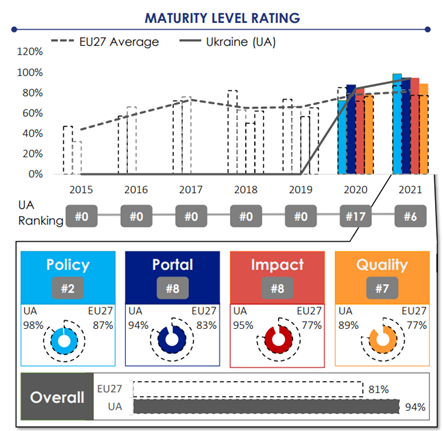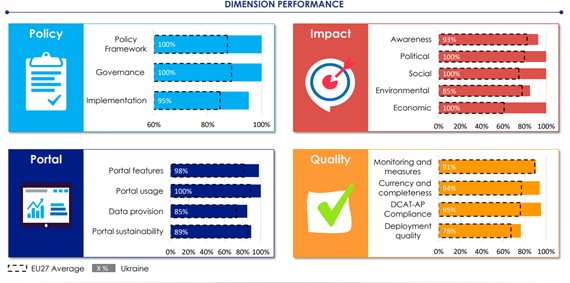The acceleration of open data practices in Ukraine
The case of Ukraine as one of the open data best practices in Europe
The 2021 edition of the Open Data Maturity assessment has shown peak performances across all European countries, with the EU27 average maturity score reaching 81%, i.e., 3 percentage points more than in 2020. Among the top performers of this edition, Estonia, Slovenia, and Ukraine were highlighted in the 2022 report “Open Data Best Practices: Estonia, Slovenia & Ukraine”. To explore their impressive growth in maturity score and encourage knowledge sharing across countries, a data.europe.eu academy webinar was recently organised. Although the Ukrainian open data team was not able to attend the webinar due to the current situation in the country, their efforts to move towards open data deserve a special mention on this data story.
Ukraine as an open data trend-setter
Despite being a particularly new member in the Open Data Maturity assessment, over 2020-2021 Ukraine has realised an exponential growth in its open data maturity score within these two years. While in 2020 it ranked 17th, in 2021 Ukraine has positioned itself 6th out of 34 participating European countries (Figure 1).

Ukraine’s strong performance across all dimension
These results rely on important improvements across all 4 open data dimensions: policy, impact, portal and quality (Figure 2).

Policy dimension - Increasing transparency through legislation and an open data strategy
Over the years, Ukraine has taken important policy steps to increase the transparency of government activities, prevent and detect corruption, as well as develop innovations based on open data.
In 2015, the Cabinet of Ministers of Ukraine approved the Decree 835 “On approval of the Regulations on data sets to be published in the form of open data”. This legislation, which is regularly revised and updated, lies at the centre of the Ukrainian open data policy.
In 2018 the first open data strategy was adopted and for early 2022 the Ministry of Digital Transformation - responsible for the Ukrainian open data policy – has planned to publish a new version of the strategy based on the six principles of the “International Open Data Charter”.
Impact dimension - Understanding and monitoring the reuse of open data
While measuring the impact of open data remains very difficult also for key performers like Ukraine, understanding the level of re-use of Ukrainian open data has been the key highlight of 2021.
Firstly, as established by the Decree 835, all public bodies in Ukraine are obligated to monitor their open data programs, including the re-use of their own or other public bodies' open data.
Secondly, within the national data portal, the “Diia Open Data”* (Action Open Data) offers a dedicated “impact of open data” section on various areas (e.g. ecology, construction, health etc.), which increases the level of transparency and knowledge about open data and its benefits.
Finally, to support interested parties in conducting research on the topic, the Ukrainian open data team has drafted regular guidelines for both a qualitative and quantitative approach to assessing the impact of open data. A new economic impact study, based on the data.europe.eu´s report “The Economic Impact of Open Data: Opportunities for value creation in Europe”, was initially planned for March 2022.
Portal dimension - Enriching their data catalogue with user-centric approach
With a data catalogue containing more than 42.000 datasets and with around 5-7 million users´ visits every month, the open data portal of Ukraine performs well across all assessed categories. Key to this success is certainly the use-centric approach used by the Ukrainian open data team. Updates are always based on user feedback and usage insights gained from user statistics. For the future of the portal, the challenge remains to overcome technical incompatibilities of publishers and lack of human resources that sometimes prevent the publication of all required datasets.
Quality dimension - Working on metadata and data compliance
Regarding the quality of open data in Ukraine, more than 90% of the portal’s metadata is compliant with the mandatory and recommended classes of DCAT-AP. Moreover, all metadata is regularly checked for accuracy and in case of errors, data providers are notified. Finally, an extensive analytics module is in place to control the quality of datasets and its metadata using interactive visualisations.
To achieve better open data quality, for 2022 the Ukrainian open data team has planned to develop new standards for typical and high-value datasets, while continuing to ensure close communication with data providers.
A successful story driven by an open mind-set and willingness to comply with EU standards
The successful performance of Ukraine was built in two main steps.
- Catching up on open data policy by looking at best practices in Europe - Although Ukraine is not an EU Member State and therefore is not obliged to comply with EU legislation, Ukraine has analysed some best practices and initiatives from Europe and transposed features such as the Open Data Directive into their open data strategy.
- Becoming a trend-setter by going beyond the benefits of open data - Instead of solely focussing on open data to fight corruption, the Ukrainian open data team decided between 2020 and 2021 to switch to a more overarching perspective, targeting a broader set of policy challenges and involving users across all sectors.
In a nutshell, after analysing and implementing key learnings drawn from the experience of other European countries, Ukraine´s change in mindset and greater attention to the sustainability of open data activities were essential to accelerate its open data practice. In particular, putting citizens at the centre of service improvement represented a decisive move for Ukraine to become one of Europe´s frontrunners in the promotion and use of open data.
* At the moment of writing the Diia Open Data portal cannot be accessed
